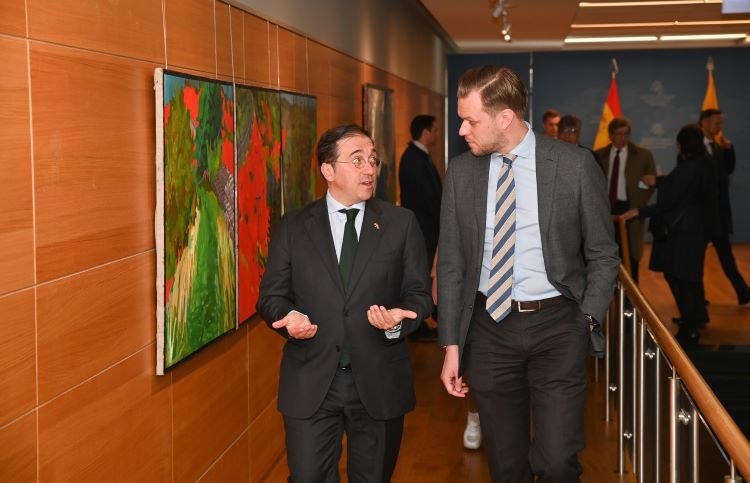The Diplomat
The Ministers of Foreign Affairs, José Manuel Albares, and Defense, Margarita Robles, traveled yesterday to the Baltic republics of Lithuania and Latvia, where they visited Spanish troops assigned to NATO’s eastern flank missions.
Albares was received in Vilnius by the Lithuanian Minister of Foreign Affairs, Gabrielius Landsbergis. He then held a meeting with the President of the Republic, Gitanas Nauséda, with whom he discussed the upcoming NATO summit in Madrid and exchanged views on the challenges and opportunities for the two countries and the EU in the current geopolitical context, and finally visited the Spanish military detachment located at the Šiauliai air base, in the framework of NATO’s Baltic Air Police operation.
After his meeting with Landsbergis, the two foreign ministers held a joint press conference in which Albares described as “completely unacceptable” the “use of gas as a political weapon”, following Russia’s decision to cut off supplies to Poland and Bulgaria, and asked the EU not to fall “into this trap” and to maintain “unity” in this matter – while recognizing that “not all countries have the same exposure or link with Russia” – to prevent “European capitals from financing Vladimir Putin’s war” and the war itself from “destabilizing European countries”.
Likewise, the minister assured that Spain will support the sixth package of sanctions that the EU is preparing against Russia because it is necessary “to do everything possible to reduce Russia’s military effort in this unjust war”.
For his part, Landsbergis assured that “the bilateral relationship is now stronger than ever” and that the celebration this year of the “centenary of the recognition by Spain of Lithuania’s independence” is “a great opportunity to further strengthen bilateral relations in various areas and implement joint projects”.
Likewise, the Lithuanian Foreign Minister thanked Spain for its contribution to strengthening the security of Lithuania and Europe as a whole. “Spanish planes and pilots are now protecting our airspace, as they are participating in the NATO Air Policing mission. This is a very important support for us and a practical expression of solidarity,” he stated.
According to Landsbergis, the NATO Summit in Madrid should properly assess the new security environment and the threats generated by Russia. “Today, more than ever, we need to make decisions for a credible defense of NATO’s eastern flank,” he said. The Lithuanian minister also called for increased pressure on Russia to reduce its ability to finance war. “For several weeks we have been discussing the need to impose an embargo on Russian oil and gas imports. I understand that such a solution would be economically painful for some EU countries, but it is necessary if we want to starve the aggressor’s war machine,” he warned.
Robles in Latvia
For her part, Margarita Robles visited yesterday the Spanish contingent deployed at the Adazi base in Latvia, which she thanked for its work in NATO’s Enhanced Forward Presence (eFP) operation to contribute to deterrence on the Alliance’s eastern flank. Spain is currently contributing to the mission with 506 military personnel from the Canadian-led Battle Group, making it the second largest contributor to the operation.
“I want to thank them from the bottom of my heart for their effort, their work, and for the high standard they are setting for the Spanish flag. In these complicated and difficult times, with the presence of the Spanish Armed Forces in Latvia, we are telling the world that Spain is committed to peace and that it will not leave Ukraine or its citizens alone,” said Robles, who was accompanied by the Secretary of State for Defense, Esperanza Casteleiro, and held meetings with the Latvian Chief of Defense Staff, Lieutenant General Leonids Kalnins, and with the country’s Secretary of Parliamentary Affairs, Baiba Blodniece.
The Government decided last March to reinforce the presence of the Spanish force with around 150 more military personnel, in the framework of the response plans to preserve peace and security after Russia’s invasion of Ukraine, approved by all NATO member countries. “I want to emphasize the unity of all countries and make it clear to Putin that this terrible and cruel war in Ukraine is not going to win it,” the minister warned yesterday.







